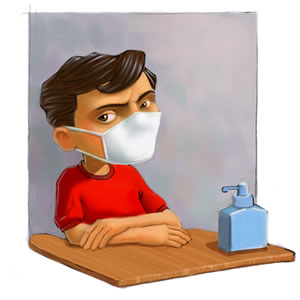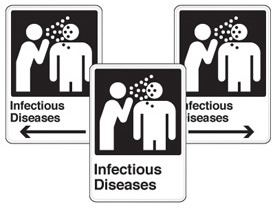Difference between Infectious and Contagious
Key Difference: Infectious diseases are caused by a microorganism and therefore potentially infinitely transferable to new individuals. Contagious diseases are very communicable disease capable of spreading rapidly from one person to another by contact or close proximity.
 The recent Ebola scare has resulted in many people being worried about leaving their homes. Similar scares have been happening through the time and can date back to the old black plague. With these scares comes an array of scientific words that often confuse the public further. When articles over the internet talk about how infectious Ebola is, people are often left wondering should they isolate themselves for protection. Contagious and infectious are two words that are commonly used to determine how a disease is spread and one should (for the own protection and the safety of others) understand the difference between the two.
The recent Ebola scare has resulted in many people being worried about leaving their homes. Similar scares have been happening through the time and can date back to the old black plague. With these scares comes an array of scientific words that often confuse the public further. When articles over the internet talk about how infectious Ebola is, people are often left wondering should they isolate themselves for protection. Contagious and infectious are two words that are commonly used to determine how a disease is spread and one should (for the own protection and the safety of others) understand the difference between the two.
My health care professionals often use this word interchangeably but they will only do so if a disease or condition is both infectious and contagious. Let’s define the terms. The Center for Disease Control (CDC) defines contagious diseases as, “a very communicable disease capable of spreading rapidly from one person to another by contact or close proximity.” This means that the disease can be spread from a person to person on close contact and also via touching, sharing items and sex.
 Infectious disease is defined as, “a disease caused by a microorganism and therefore potentially infinitely transferable to new individuals.” These diseases can only be cause by bacterial transfer. Certain diseases might be communicable, which means they are both infectious as well as contagious. Such diseases include influenza, cold and flu. However, certain diseases cannot be spread via basic touch, such as food poisoning, malaria, etc.
Infectious disease is defined as, “a disease caused by a microorganism and therefore potentially infinitely transferable to new individuals.” These diseases can only be cause by bacterial transfer. Certain diseases might be communicable, which means they are both infectious as well as contagious. Such diseases include influenza, cold and flu. However, certain diseases cannot be spread via basic touch, such as food poisoning, malaria, etc.
Many diseases easily fall under the category of being both infectious and contagious. Although infectious diseases require bacteria, the bacteria can be passed through basic touch. This is the how the flu or common cold usually transferred. Contagious is usually measured on a scale, with diseases usually being highly contagious or not that contagious. For example, AIDS is not highly contagious unless spread via sharing of needles or unprotected sex. Similarly, the flu is highly contagious as the bacteria can pass simply via touch or sharing objects. Certain diseases such as malaria, Ebola or tic fever are often considered to be very less contagious.
Comparison between Infectious and Contagious:
|
|
Infectious |
Contagious |
|
Definition |
A disease caused by a microorganism and therefore potentially infinitely transferable to new individuals |
A very communicable disease capable of spreading rapidly from one person to another by contact or close proximity |
|
Spread via |
Bacteria |
Touch, touch can also spread bacteria |
|
Examples |
Malaria Ebola Cholera AIDS Tick Fever |
Influenza Cold Flu |
Image Courtesy: laelh.blogspot.com, seton.ca









Add new comment